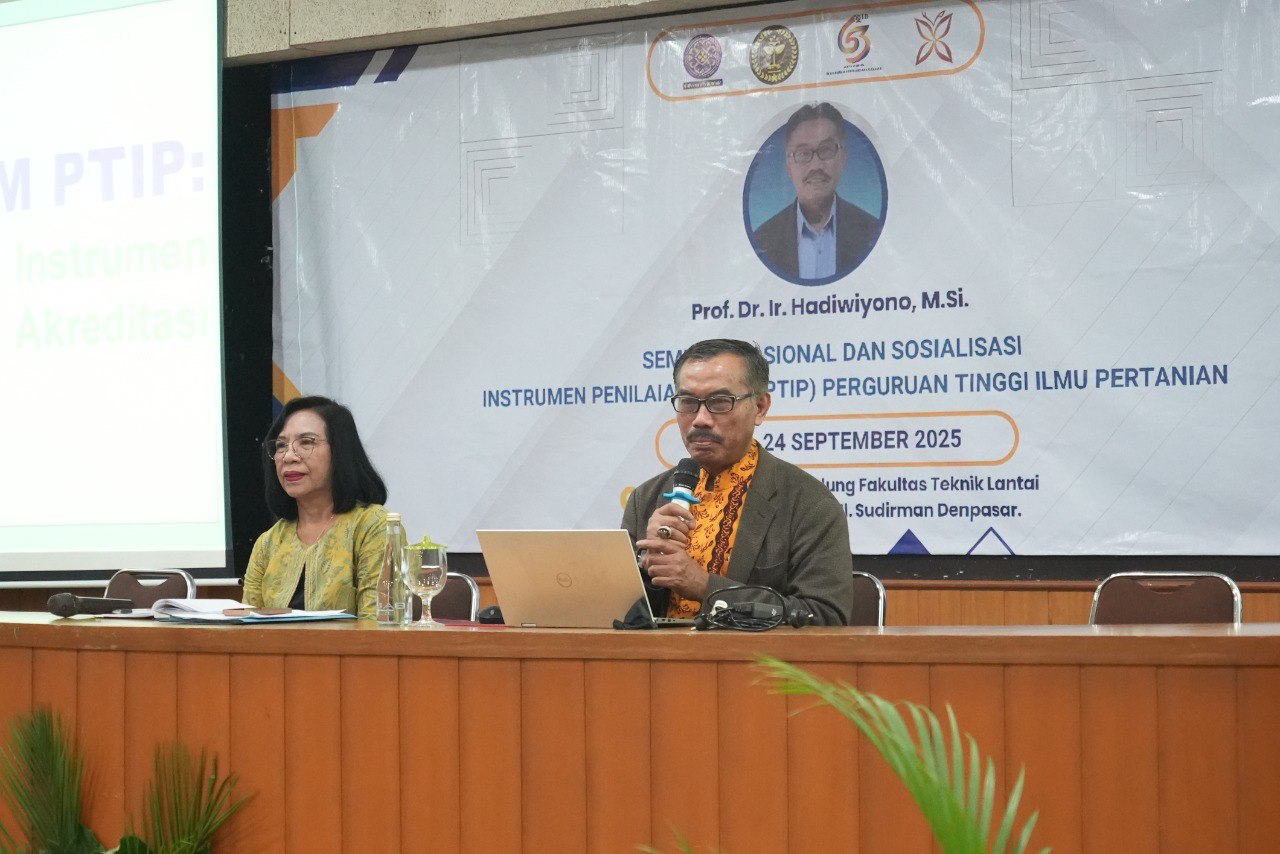Faculty of Agriculture at Udayana University Holds National Seminar and LAM-PTIP Socialization
Denpasar – The Faculty of Agriculture at Udayana University held a National Seminar and Socialization of the LAM-PTIP Assessment Instruments for Higher Education in Agricultural Sciences. The event took place at the Wiswakarma Hall, Faculty of Engineering Building, Sudirman Campus, Denpasar, on Wednesday (September 24, 2025).
This seminar was part of a series of events celebrating the 58th Anniversary of the Faculty of Agriculture, the 47th BKFP (Family of Agricultural Faculty Members), and the 63rd Anniversary (Dies Natalis) of Udayana University. It was attended by around 140 participants, including leaders and lecturers from six universities in Bali with faculties in agriculture, as well as lecturers, administrative staff, and student representatives from Udayana University’s Faculty of Agriculture.
The seminar featured Prof. Dr. Ir. Hadiwiyono, M.Si as the keynote speaker.
In her opening remarks, Vice Dean I, Dr. Putu Udayani Wijayanti, SP., M.Agb., representing the Dean of the Faculty of Agriculture, explained that LAM-PTIP (The Independent Accreditation Institution for Higher Education in Agricultural Sciences) is an independent body with the authority and responsibility to assess, ensure, and improve the quality of higher education in agriculture across Indonesia. She emphasized that LAM-PTIP serves as a quality assurance body ensuring that every agricultural study program nationwide meets national higher education standards and aspires toward international benchmarks.
“In the context of accreditation, LAM-PTIP plays an irreplaceable role in setting standards, conducting evaluations, and issuing accreditation recommendations for agricultural study programs,” she stated.
The accreditation instruments developed by LAM-PTIP are designed comprehensively to assess various key aspects of educational management, including vision and mission, governance, curriculum, learning processes, human resources, infrastructure, research, community service, and internal quality assurance systems. With these valid and reliable instruments, it is expected that each study program can conduct objective self-evaluations and identify areas for improvement to achieve higher quality standards.
“Recognizing the importance of LAM-PTIP’s role, the organization of this National Seminar has a very strategic objective and relevance, especially for lecturers within the Faculty of Agriculture at Udayana University and its partner institutions. The main goal is to deepen our understanding of the latest accreditation instruments developed by LAM-PTIP,” she added.
Meanwhile, Udayana University Rector, Prof. Ir. I Ketut Sudarsana, ST., Ph.D, in his remarks, said that the presence of the keynote speaker—who also serves as the coordinator of the instrument development team—would provide valuable insight into the key points and specific elements involved in completing accreditation documents for LAM-PTIP.
“We all understand that accreditation is a form of external accountability for educational institutions to stakeholders. Therefore, let’s revisit what these instruments focus on. Once we understand them, they must be implemented effectively by the team responsible within the Faculty's UP3M (Quality Assurance Unit). We already implement the Internal Quality Assurance System (SPMI) and conduct Internal Quality Audits (AMI) annually,” he explained.
The Rector also expressed hope that lecturers within agricultural disciplines could become assessors in the future, noting that there is a selection process involved.
“Why become an assessor? Because it opens opportunities to build networks among similar study programs across Indonesia, and it also allows us to better understand the strengths and weaknesses of our own programs compared to those we assess,” said the Rector.
He concluded by expressing hope that the seminar would be beneficial not only for agricultural study programs but also for related disciplines and that the Faculty of Agriculture would continue to support the government’s Asta Cita programs, particularly those related to food security.





